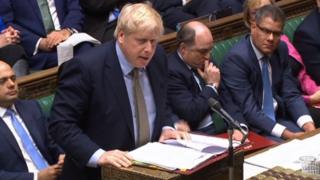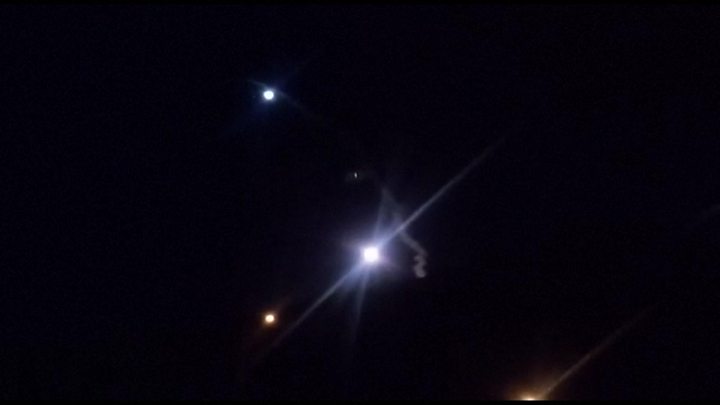[ad_1]
 Image copyright
Image copyrightEPA/UK PARLIAMENTARY RECORDING UNIT
Boris Johnson addressed MPs in his first Prime Minister’s Questions since Parliament returned from its Christmas break
Boris Johnson has warned Iran not to repeat “reckless and dangerous” attacks after ballistic missiles were fired at air bases in Iraq where coalition forces are stationed.
The prime minister called for “urgent de-escalation” after strikes on bases in Irbil and al Asad.
He said there were no UK casualties “as far as we can tell”.
Iran’s Revolutionary Guard said the strikes were in retaliation for the death of General Qasem Soleimani.
He was killed outside Baghdad airport on Friday in a missile strike ordered by US President Donald Trump.
“We of course condemn the attack on Iraqi military bases hosting coalition forces,” Mr Johnson said.
“Iran should not repeat these reckless and dangerous attacks but must instead pursue urgent de-escalation.”
His comments were made at his first Prime Minister’s Questions since Parliament returned from its Christmas break.
Mr Johnson will later discuss the situation at a meeting with EU Commission President Ursula von der Leyen.
Getty Images
The al Asad airbase in western Iraq was hit by at least six missiles
Labour leader Jeremy Corbyn said US-Iran tensions were in “real risk” of developing into “full-scale war” and asked the prime minister whether British personnel in the area were safe.
Mr Johnson said: “As far as we can tell there were no casualties last night sustained by the US and no British personnel were injured in the attacks.
“We are doing everything we can to protect UK interests in the region, with HMS Defender and HMS Montrose operating in an enhanced state of readiness to protect shipping in the Gulf.”
‘British blood on his hands’
Mr Corbyn also questioned the legality of the drone strike that killed General Soleimani on 3 January.
The PM said it was not up to him to comment “since it was not our operation”, but added: “I think most reasonable people would accept that the United States has the right to protect its bases and its personnel.”
Mr Johnson said General Soleimani had supplied “improvised explosive devices to terrorists” which “killed and maimed British troops”, adding: “That man had the blood of British troops on his hands.”
Iran’s Supreme Leader Ayatollah Khamenei described the missile attack as “a slap in the face” for the US.
 Media playback is unsupported on your device
Media playback is unsupported on your deviceThe strike showed just a “small part” of the capabilities of the Iranian armed forces, the chief of staff for the military said.
But Iran’s ambassador to the UK, Hamid Baeidinejad, said the attack was an act of self-defence and the country “does not seek escalation or war”.
More than a dozen missiles were fired from Iranian territories into Iraq at about 02:00 local time on Wednesday (22:30 GMT on Tuesday).
The al Asad airbase – located in the Anbar province of western Iraq – was hit by at least six missiles.
There are about 400 UK troops stationed in Iraq, primarily to assist Iraqi troops in defeating the Islamic State group.
A Ministry of Defence spokesman said: “We are urgently working to establish the facts on the ground. Our first priority continues to be the security of British personnel.”
Getty Images
Iraqi security forces gathered pieces of the missiles at al Asad airbase, west of Baghdad
In the UK, police were “extremely alert” to any impact the crisis in Iran may have in Britain, the Metropolitan Police commissioner Cressida Dick has said.
On Tuesday, the Royal Navy and military helicopters were put on standby in the Gulf amid the rising tensions in the Middle East.
The government said non-essential UK personnel had also been moved out of the Iraqi capital Baghdad.
Iran had vowed “severe revenge” following the assassination of Soleimani.
The general – who controlled Iran’s proxy forces across the Middle East – was regarded as a terrorist by the US government.
[ad_2]















































